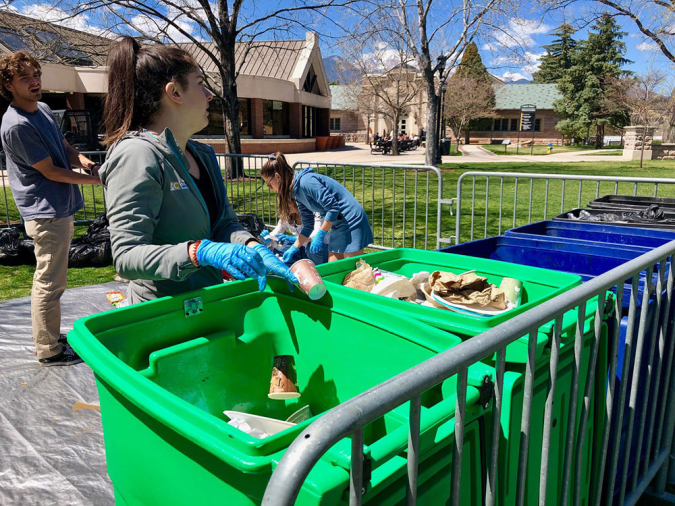
Charge: As part of CC's identity and responsibility as the only liberal arts college in the Rocky Mountain West, the college is committed to working toward carbon neutrality. That process will ensure that the college is recognized as a model of environmental stewardship and innovation by advancing both the study and the practice of sustainability.
What's Happening: Colorado College has achieved carbon neutrality, a goal it set in 2009 when it committed to becoming carbon neutral by 2020. After a decade of work, the ambitious target has been met - even as the college increased its building footprint by more than 10% during that time. CC is only the eighth higher ed institution in North America, and the first in the Rocky Mountain region, to achieve this goal. A campus celebration marked the achievement January 24.
"This achievement is a shared effort; the result of the hard work, commitment, and resourcefulness of the entire Colorado College community," says President Jill Tiefenthaler.
 Colorado College stands out among other schools that have reached carbon neutrality in an important way: It has the greatest emission reductions on campus while buying fewer offsets than any other U.S campus. This means the milestone has been achieved primarily by steep reductions in the college's carbon footprint on campus.
Colorado College stands out among other schools that have reached carbon neutrality in an important way: It has the greatest emission reductions on campus while buying fewer offsets than any other U.S campus. This means the milestone has been achieved primarily by steep reductions in the college's carbon footprint on campus.
"We've done the difficult work of reducing our on-campus emissions first, rather than what some see as 'buying our way' to neutrality through offsets," says CC Director of Sustainability Ian Johnson. Colorado College has done this in a replicable and scalable way, meaning nearly any other institution could apply the strategies used by CC to achieve its goal of carbon neutrality.
Another significant factor is that Colorado College is the only carbon-neutral institution located in a high-carbon-intensity electric grid with two functioning coal plants operating in and near the city. This is noteworthy, Johnson says, because "electricity use in our region generates more carbon emissions than most any other region, making major reductions in our footprint all the more difficult to achieve as our electricity use pushes up emissions faster than other institutions. It also means our renewable energy generation and use have bigger impacts on global emissions than in other regions."
Colorado College embarked on its journey to carbon neutrality in 2009, when then-president Richard F. Celeste signed the American College and University Presidents' Climate Commitment (ACUPCC), now known as the Second Nature Carbon Commitment.
Because climate change is linked to and influenced by many different factors - from environmental racism to human health and income inequality, clean water, food production and access, and more - achieving carbon neutrality impacts far more than
just the college's operations, says Johnson. Many of the initiatives the college is undertaking, from adding more sustainability courses to finding new ways to make the college more accessible to students from diverse backgrounds, increase students' literacy in sustainability and help build the resilient society that will be needed to adapt to impacts from climate change.
Some of the college's major initiatives:
- A behavioral change program involving 14 weeks, 14 habits, and a 14% reduction in electricity, heat, and water use. CC saved nearly $100,000 in utility costs through the "aCClimate14" effort.
- Colorado College's first high-performance energy design guidelines were written for new and renovated buildings.
- Tutt Library is the nation's largest academic net-zero energy library following a massive underground geothermal energy project and major renovations.
- East Campus Housing opened with sustainable architecture and energy systems.
- Numerous solar PV installations constructed on and off campus, originally initiated by a student in 2008.
- CC has worked with Colorado Springs Utilities over the past decade, a partnership that led to the addition of the 255 megawatts of solar in current and planned projects for the utility.
 To account for remaining emissions, which include college-related air travel, study abroad, commuting, and wastewater, Colorado College is investing in carbon offsets - innovative projects that reduce or eliminate greenhouse gas emissions elsewhere. Specifically, CC has invested in a methane destruction project at the Larimer Country landfill in Northern Colorado. This project prevents methane (CH4), a very potent greenhouse gas, from entering the atmosphere, and instead uses the CH4 to generate electricity directly to the Larimer County community.
To account for remaining emissions, which include college-related air travel, study abroad, commuting, and wastewater, Colorado College is investing in carbon offsets - innovative projects that reduce or eliminate greenhouse gas emissions elsewhere. Specifically, CC has invested in a methane destruction project at the Larimer Country landfill in Northern Colorado. This project prevents methane (CH4), a very potent greenhouse gas, from entering the atmosphere, and instead uses the CH4 to generate electricity directly to the Larimer County community.
The Larimer County landfill project has co-benefits that go beyond reducing emissions; it has opened doors for future carbon-related markets, reduced air pollution in the Front Range by adding renewable energy to the grid and supports the local community of Larimer County.
Although CC has met its carbon neutrality goal, it does not mean the work is finished. President Tiefenthaler and the Board of Trustees have put together a Climate Change Task Force, led by Provost Alan Townsend, to take on a "What's Next" project looking at operations, leadership beyond CC, academics and the co-curricular, and the endowment.
"Addressing climate change will take strong, consistent work from institutions of every kind," Townsend says. "CC has shown that significant progress in the climate impact of operations is possible in a relatively short period of time, and we are committed to showing that can be done in other sectors as well."



